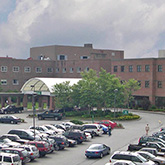Learn about arrhythmias and treatment options at Central Vermont Medical Center.
Request an Appointment
Request an appointment with a UVM Health Network – Central Vermont Medical Center cardiologist.
Arrhythmias occur when the electrical impulses in your heart aren't working properly, causing your heart to beat too fast, too slow or irregularly. These disorders can occur in the upper chambers of the heart, known as the atrium, or the lower chambers, the ventricles.
There are three categories of arrhythmias:
- Fast Heart Rhythm
- Slow Heart Rhythm
- Uncoordinated Heart Rhythm
Arrhythmias are common problems affecting millions of people nationwide. In many cases, they are not serious, with occasional irregular heartbeats that may produce a fluttering feeling called palpitations. However, some heart arrhythmias can be severe and possibly life threatening.
Arrhythmias: What you Need to Know
Prevention
Some arrhythmias cannot be prevented - they are a result of genetics and family history. However, maintaining a healthy heart lifestyle can help to prevent the development of any cardiac disease. Eat a healthy diet, exercise regularly, avoid smoking and consider ways to reduce stress.
Personalized Care
We are fully committed to providing a caring, personal approach to every patient and family we see. We spend as much time with you as you need - answering all your questions and working together to develop a treatment plan that works for you.
Experienced, Expert Care
The Heart Rhythm Program at The UVM Health Network includes internationally-recognized experts, several of whom were recruited from the world-renowned Cardiac Arrhythmia Research Institute, a center on the frontiers of heart rhythm care. We coordinate care around the network because we believe that patients around the region with heart rhythm disorders should have access to the best care close to home.
What are Arrhythmias?
Approximately four million Americans have arrhythmias, or irregular heart beats. However, many of these disorders go undetected because people do not recognize the symptoms.
Heart Rhythm abnormalities fall under three categories of arrhythmias:
Fast Heart Rhythms
A fast heart rhythm is when your heart beats too quickly. There are a few types of fast heart rhythms:
Atrial fibrillation
Atrial fibrillation is one of the most common types of heart rhythm disorders and occurs when the atria, or upper chambers of the heart, fail to beat in a synchronized manner. The resulting pooling of blood can lead to a stroke.
Ventricular tachycardia
Ventricular tachycardia is a rapid heart rate that starts in the heart's lower chambers, or ventricles, and is often associated with other heart problems. It may be life threatening.
Supraventricular tachycardia (SVT)
SVT is a rapid heart rate that starts above the heart's lower chambers. SVT is not typically life threatening but can cause palpitations, fatigue, shortness of breath or even passing out.
Sudden cardiac arrest
Sudden cardiac arrest, or heart attack, is a medical emergency that occurs when a patient's heart suddenly stops functioning, causing blood to stop flowing to the body. Sudden cardiac arrest usually occurs in conjunction with other heart problems and requires immediate attention.
Slow Heart Rhythms
Bradycardia is a condition in which your heart beats very slowly. Most prevalent in people 65 years of age and older, a slow heart rhythm can cause dizziness, shortness of breath, fatigue, chest pain, confusion, or fainting. Some people may have no serious symptoms or complications, but in severe cases, bradycardia can lead to life-threatening complications.
Uncoordinated Heart Rhythms
Ventricular dyssynchrony, or uncoordinated heart rhythm, is a condition in which the two ventricles of your heart beat out of sync with each other. The uncoordinated pumping can lead to dangerous changes in the size and shape of the heart and more severe heart rhythm problems.
Risk factors for fast, slow, or uncoordinated heart rhythms include:
- Having heart disease or being at high risk for heart disease
- An abnormal heart valve
- An electrolyte abnormality in your blood, such as low potassium
- Taking certain medications
- An overactive thyroid
- Low levels of oxygen in your blood
Diagnosis and Treatment: Arrhythmias
Some heart rhythm disorders can be easily treated with medications. Others may require the cardiac ablation or the implantation of a pacemaker or defibrillator. Our providers strive to help patients understand and evaluate appropriate treatments.
The UVM Health Network Heart Rhythm Program offers leading treatments, including:
- Inpatient and outpatient arrhythmia care
- Eletrophysiologic studies
- Ambulatory heart monitoring
- Complex catheter ablation*
- Implantation of pacemakers, defibrillators, biventricular resynchronization devices* and physiologic (direct His-bundle) pacing devices*
*Indicate treatment only available at the Network level.
To make an appointment with one of our specialists, please call 802-225-5660

CVMC Cardiology
Phone
Fax
802-229-9533
Hours
Monday:Phone Hours:
8:30 pm - 12:00 pm
1:00 pm - 5:00 pm

